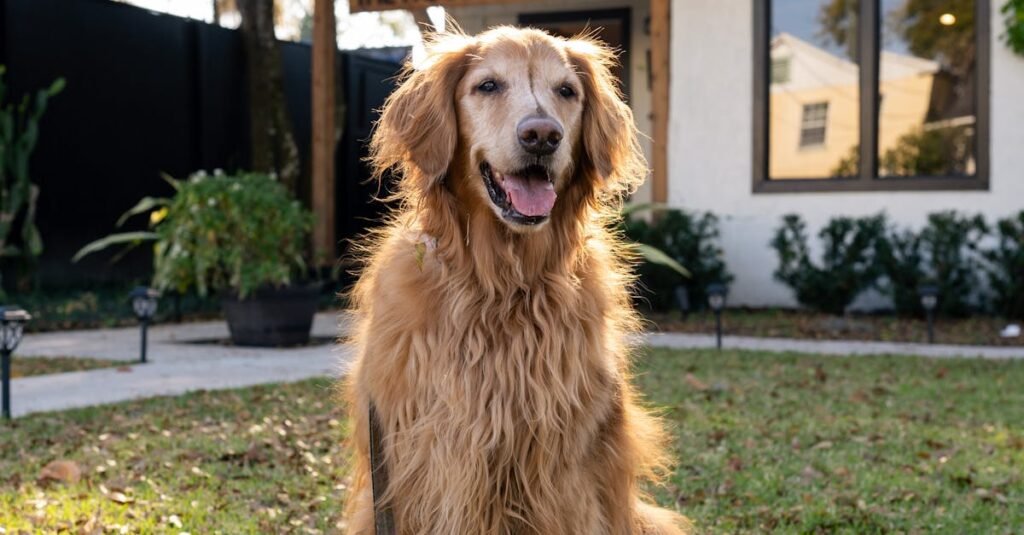
What Do Dogs See at Night? Exploring Canine Night Vision
Estimated reading time: 5 minutes
What Do Dogs See at Night: Key Takeaways
- Dogs have superior low-light vision but cannot see in total darkness.
- Their tapetum lucidum enhances night vision by reflecting light.
- Dogs rely on motion detection and peripheral vision to navigate in dim light.
- Breeds like greyhounds may have better night vision due to retinal differences.
- Use reflective gear and dim lighting to help your dog at night.
Table of Contents
How Dogs See in Low Light – The Basics of Canine Night Vision
Rod vs. Cone Distribution
– Rods detect light, while cones detect color.
– Dogs have more rods (excellent for dim light) but fewer cones (poorer color vision).
– Source: AKC, Whole Dog Journal.
Field of View & Motion Detection
– Dogs see 240–250° (vs. humans’ 180°), helping them detect movement better.
– Improved peripheral vision aids navigation in darkness.
– Source: Two Tails, Pupford.
Pupil Adaptation
– Larger pupils let in more light.
– Helps dogs see better in dim environments.
– Source: Zigzag.
Why Dogs Adapt Better to Darkness Than Humans
Tapetum Lucidum: The Eye’s Mirror
– A reflective layer behind the retina that amplifies light.
– Causes the “glowing eyes” effect in photos or headlights.
– Source: AKC, YouTube.
Evolutionary Advantages
– Descended from crepuscular hunters (active at dawn/dusk).
– Evolved to detect prey in low light.
– Source: Heart + Paw.
Superior Pupil Dilation
– Pupils dilate wider than humans’ for max light intake.
– Helps in tracking movement in dim lighting.
– Source: Dutch.
Can Dogs See in Complete Darkness? Debunking the Myth
Light Dependency
– Dogs need some light (e.g., moonlight) to see.
– No true night vision—just superior dim-light adaptation.
– Source: PetMD, Dutch.
Backup Senses Take Over
– Smell, hearing, and whiskers guide them in pitch-black settings.
– Source: Heart + Paw.
Dog vs. Cat Night Vision
– Cats see better in total darkness than dogs.
– Dogs outperform humans but not nocturnal animals.
– Source: Two Tails.
The Science Behind Dogs’ Night Vision
Color Perception in Low Light
– Dogs see blues/yellows (dichromatic vision).
– Poor red-green detection, but better contrast in dim lighting.
– Source: Zigzag.
Breed Variations
– Greyhounds & Labradors may have enhanced night acuity due to retinal differences.
– Source: Pupford.
Practical Tips for Dog Owners
Nighttime Safety Measures
– Use reflective gear on nighttime walks.
– Avoid pitch-black areas to prevent tripping.
– Source: Pupford.
Indoor Lighting Tips
– A dim nightlight helps senior dogs navigate.
– Source: PetMD.
Fun Fact: The Tapetum Lucidum Glow
– The “eye shine” in photos is caused by the reflective layer.
– Humans’ eyes appear red (different structure).
– Source: YouTube.
Conclusion
What Do Dogs See at Night? They see a world transformed by their specialized visual adaptations – a landscape of movement, shapes, and limited colors illuminated by their remarkable light-sensitive eyes. Though not as sharp or colorful as their daytime vision, a dog’s night vision allows them to navigate and track movement in conditions where humans would be nearly blind. What Do Dogs See at Night is not just a question of visual acuity, but of understanding how our canine companions experience and interpret their nocturnal world through a fascinating combination of enhanced low-light vision and their complementary senses of smell and hearing.
Related Reads:
– Learn more about how dogs interpret the world beyond night vision: https://yourfurrycare.com/how-dogs-see-world
FAQs
A: No. Dogs need at least minimal light (like moonlight) to see. They rely on other senses like smell and hearing in total darkness.
Q: Why do dogs’ eyes glow in the dark?
A: The tapetum lucidum reflects light back through the retina, enhancing vision and causing the “glow.”
Q: Do all dog breeds have the same night vision?
A: No. Breeds like greyhounds may have better night vision due to a higher proportion of rods in their retinas.
Q: How much better is a dog’s night vision than humans?
A: Dogs see roughly 5 times better in low light due to their tapetum lucidum and rod-dominated retinas.
What Do Dogs See at Night
What Do Dogs See at Night
